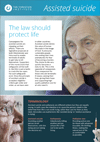The Court of Appeal has rejected a bid to challenge the law on assisted suicide, but euthanasia groups are claiming a partial victory.
Judges refused Debbie Purdy’s request to be told the specific circumstances under which her husband could be prosecuted if he helped her travel to a Swiss suicide clinic to end her life.
Opponents to legalised euthanasia say the request was “tantamount to changing the law by stealth”.
However, the euthanasia lobby group backing Miss Purdy’s case says part of the ruling indicated the courts would be lenient with those who help relatives end their lives in this way.
Miss Purdy suffers from multiple sclerosis and wants to end her life when her condition deteriorates. She wants her husband, Omar Puente, to help her travel overseas to Switzerland, where assisted suicide is allowed.
She had asked the then Director of Public Prosecutions (DPP), Sir Ken MacDonald, for guidance clarifying whether Mr Puente would be prosecuted for helping her, but Sir Ken said that to do so would effectively change the law – something that only Parliament could do.
When Miss Purdy challenged the decision, the High Court said the DPP had acted rightly. The Court of Appeal upheld this ruling yesterday.
The decision was welcomed by groups like the Care Not Killing alliance, which said the law against assisted suicide was important for protecting vulnerable people.
The alliance said: “To ask the DPP, as Ms Purdy was suggesting, to state how much assistance with suicide could be given without incurring prosecution would be tantamount to changing the law by stealth.”
But the lobby group supporting Miss Purdy’s case, Dignity in Dying, formerly the Voluntary Euthanasia Society, said the ruling hinted that courts would throw out any prosecution against those who help sufferers travel overseas to commit suicide.
The group’s Chief Executive, Sarah Wootton, said: “The court has made it quite clear that it is unlikely that Omar would be prosecuted if he were to accompany Debbie abroad for an assisted death.
“To underline this point, the judgment goes on to make clear that if someone like Omar were prosecuted, the courts are likely to dismiss the case or discharge them without a sentence.”
The group now says there should be a change in the law to allow assisted suicide.
Earlier this year the incoming DPP – Keir Starmer – decided not to prosecute the parents of 23-year-old Daniel James after they helped their son travel to Switzerland to commit suicide last year. Daniel was paralysed from the chest down after a rugby training accident in 2007.
Mr Starmer said a prosecution would not be in the public interest, and said future cases would be dealt with in a similar way. Observers said this could be taken as a ‘green light’ by those seeking to help relatives end their lives in Switzerland.
But campaigners say a robust law against assisted suicide is needed in order to protect the majority of vulnerable people who could otherwise be pressured into ending their lives or not given the help they need.
One palliative care expert, Dr David Jeffrey, has warned that in the American state of Oregon, where doctors are allowed to prescribe suicide drugs, some patients are helped to end their lives though suffering from treatable depression.
Last December he wrote that higher standards of palliative care were the “starting point of an ethical response to suffering at the end of life”.
“There is an urgent need to make palliative care available to all patients, to those with end stage cardiac failure, respiratory failure, dementia and the chronic neurological diseases such as motor neurone disease as well as to those with cancer,” he said.
Writing in the New Statesman today, BBC radio producer Victoria Brignell says that more must be done to help people who are “suddenly physically disabled so they avoid despair and learn to adjust and enjoy life”.
Miss Brignell, a tetraplegic wheelchair user, said: “The newspaper reports about Daniel James’s life and suicide make poignant reading. Apparently, he felt his body had become a ‘prison’ and he lived in ‘fear and loathing’ of his daily life.
“His parents said he found his situation ‘unbearable’ and he was ‘not prepared to live what he felt was a second-class existence’.
“But such feelings are not inevitable after becoming paralysed. The vast majority of wheelchair users, including tetraplegics like myself, lead fulfilling and active lives.”


